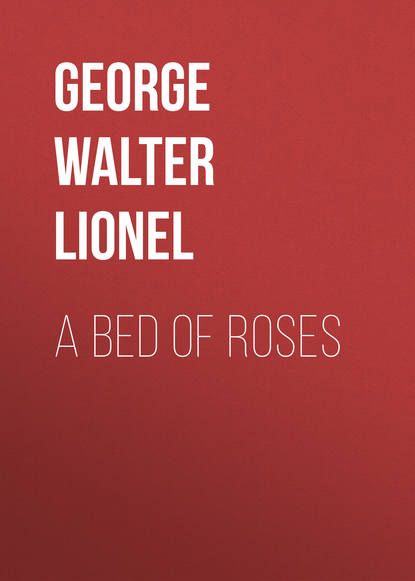По всем вопросам обращайтесь на: info@litportal.ru
(©) 2003-2024.
✖
A Bed of Roses
Настройки чтения
Размер шрифта
Высота строк
Поля
'So'm I,' she said. Then she switched on the light and pointed upstairs.
CHAPTER VIII
Victoria's new career did not develop on unkindly lines. Every night she went to the Vesuvius, where she soon had her appointed place full under one of the big chandeliers. She secured this spot without difficulty, for most of her rivals were too wise to affront the glare; as soon as she realised this she rather revelled in her sense of power, for she now lived in a world where the only form of power was beauty. She felt sure of her beauty now she had compared it minutely with the charms of the preferred women. She was finer, she had more breed. Almost every one of those women showed a trace of coarseness: a square jaw, not moulded in big bone like hers but swathed in heavy flesh; a thick ankle or wrist; spatulate fingertips; red ears. Her pride was in the courage with which she welcomed the flow of the light on her neck and shoulders; round her chandelier the tables formed practically into circles, the nearest being occupied by the very young and venturesome, a few by the oldest who desperately clung to their illusion of immortal youth; then came the undecided, those who are between ages, who wear thick veils and sit with their backs to the light; the outer fringe was made up of those who remembered. Their smiles were hard and fixed.
She was fortunate enough too. She never had to sit long in front of the little glass which she discovered to be kummel; the waiter always brought it unasked. Sometimes they would chat for a moment, for Victoria was assimilating the lazy familiarity of her surroundings. He talked about the weather, the latest tips for Goodwood, the misfortune of Camille de Valenciennes who had gone off to Carlsbad with a barber who said he was a Russian prince and had left her there stranded.
Her experiences piled up, and, after a few weeks she found she had exhausted most of the types who frequented the Vesuvius. Most of them were of the gawky kind, being very young men out for the night and desperately anxious to get off on the quiet by three o'clock in the morning; of the gawky kind too were the Manchester merchants paying a brief visit to town on business and who wanted a peep into the inferno; these were easily dealt with and, if properly primed with champagne, exceedingly generous. Now and then Victoria was confronted with a racier type which tended to become rather brutal. It was recruited largely from obviously married men whose desires, dammed and sterilised by monotonous relations, seemed suddenly to burst their bonds.
In a few weeks her resources developed exceedingly. She learned the scientific look that awakes a man's interest: a droop of the eyelid followed by a slow raising of it, a dilation of the pupil, then again a demure droop and the suspicion of a smile. She learned to prime herself from the papers with the proper conversation; racing, the latest divorce news, ragging scandals, marriages of the peerage into the chorus. She learned to laugh at chestnuts and to memorise such stories as sounded fresh; a few judicious matinées put her up to date as to the latest musical comedies. On the whole it was an easy life enough. Six hours in the twenty-four seemed sufficient to afford her a good livelihood, and she did not doubt that by degrees she would make herself a connection which might be turned to greater advantage; as it was she had two faithful admirers whom she could count on once a week.
The life itself often struck her as horrible, foul; still she was getting inured to the inane and could listen to it with a tolerant smile; sometimes she looked dispassionately into men's fevered eyes with a little wonder and an immense satisfaction in her power and the value of her beauty. Sometimes a thrill of hatred went through her and she loathed those whose toy she was; then she felt tempted to drink, to drugs, to anything that would deaden the nausea; but she would rally: the first night, when she had drunk deep of champagne after the kummel, had given her a racking headache and suggested that beauty does not thrive on mixed drinks.
Another painful moment had been the third day after her new departure. It seemed to force realisation upon her. Tacitly the early cup of tea had been stopped. Mary now never came to the door, but breakfast was laid for two in the dining-room at half past nine; the hot course stood on a chafing dish over a tiny flame; the teapot was stocked and a kettle boiled on its own stand. Neither of the servants ever appeared. On the third day, however, as Victoria lay in her boudoir, reading, preparatory to ringing the cook to give her orders for the day, there was a knock at the door.
'Come in,' said Victoria a little nervously. She was still in the mood of feeling awkward before her servants.
Mary came in. For a moment she tugged at her belt. There was a slight flush on her sallow face.
'Well Mary?' asked Victoria, still nervous.
'If you please, mum, may I speak to you? I've been talking to cook, mum, and – '
'And?'
'Oh, mum, I hope you won't think it's because we're giving ourselves airs but it isn't the same as it was here before, mum – '
'Well?'
'Well, mum, we think we'd rather go mum. There's my young man, mum, and – and – '
'And he doesn't like your being associated with a woman of my kind? Very right and proper.'
'Oh, mum, I don't mean that. You've always been kind to me. Cook too, she says she feels it very much, mum. When the major was alive, mum, it was different. It didn't seem to matter then, mum, but now – '
Mary stopped. For a moment the eyes behind the glasses looked as if they were going to cry.
'Don't trouble to explain, Mary,' said her mistress with some asperity. 'I understand. You and cook can't afford to jeopardise your characters. From the dizzy heights of trained domesticity, experts in your own line, you are justified in looking down upon an unskilled labourer. I have no doubt that you have considered the social problem in all its aspects, that you fully realise the possibilities of a woman wage-earner and her future. By all means go where your moral sense calls you: I shall give you an excellent character and demand none in exchange. There! I don't want to hurt your feelings, Mary, I spoke hastily,' she added as the maid's features contracted, 'you only do this to please your young man; that is woman's profession, and I of all people must approve of what you do. If you don't mind, both of you, you will leave on Saturday. You shall have your full month and a month's board allowance. Now send up cook, I want to order lunch.'
She could almost have wept as she lay with her face in the cushion. Her servants had delivered an ultimatum from womankind, and lack of supplies compelled her to pick up the guage of battle. Mary and cook were links between her and all those women who shelter behind one man only, and from that vantage ground hurl stones at their sisters beyond the gates. The significance of it was not that their services were lost to her, but that she must now be content to associate with another class. Soon, however, her will was again supreme. 'After all,' she thought, 'I have done with Society. I'm a pirate; Society 'll be keen enough when I've won.'
Within three days she had readjusted her household. She had decided to make matters easy by engaging two German girls. Laura, the cook, said at once that it was all one to her who came to the house and who didn't, so long as they left her alone in the kitchen, and provided she might bring her large tabby cat. Augusta the maid, a long lanky girl with strong peasant hands and carroty hair, declared herself willing to oblige the herrschaft in any way; she thereupon demanded an increase on the wages scheduled for her at the registry office. She also confided to her new mistress that she had a kerl in Germany, and that she would do anything to earn her dowry.
Thus the establishment settled down again. Laura cooked excellently. Augusta never flinched when bringing in the tea tray. Her big blue Saxon eyes seemed to allow everything to pass through them leaving her mind unsoiled, so armoured was her heart by the thought of that dowry. As for Snoo and Poo: they chased the tabby cat all over the house most of the day, which very soon improved their figures.
Thus the even tenour of Victoria's life continued. She was quite a popular favourite. As soon as she sat down under the chandelier half-a-dozen men were looking at her. Sometimes men followed her into the Vesuvius; but these she seldom encouraged, for her instinct told her that so beautiful a woman as she was should set a high price on herself, and high prices were not to be found in Piccadilly. Among her faithful was a bachelor of forty, whom she only knew as Charlie. This, by the way, was a characteristic of her acquaintances. She never discovered their names; some in fact were so guarded that they had apparently discarded their watches before coming out, so as to conceal even their initials. None ever showed a pocketbook. Charlie was dark and burned by the sun of the tropics; there was something bluff and good-natured about him, great strength too. He had sharp grey eyes and a dark moustache. He spoke extraordinarily fast, talked loosely of places he had been to: China, Mozambique, South America. Victoria rather liked him; he was totally dull, inclined to be coarse; but as he invariably drank far too much before and when he came to the Vesuvius, he made no demands on her patience, slept like a log and went early, leaving handsome recognition behind him.
There was Jim too, a precise top-hatted city clerk who had forced himself on her one Saturday afternoon as she crossed Piccadilly Circus. He seemed such a pattern of rectitude, was so perfectly trim and brushed that she allowed herself to be inveigled into a cab and driven to a small flat in Bayswater. He was too prudent to visit anybody else's rooms, he said; he had his flat on a weekly tenancy. Jim kept rather a hold on her. He was neither rich nor generous; in fact Victoria's social sense often stabbed her for what she considered undercutting, but Jim used to hover about the Vesuvius five minutes before closing time, and once or twice when Victoria had had no luck he succeeded like the vulture on the stricken field.
Most of the others were dream figures; she lost count of them. After a month she could not remember a face. She even forgot a big fellow whom she had called Black Beauty, who came down from somewhere in Devonshire for a monthly bust; he was so much offended that she had the mortification of seeing him captured by one of the outer circle who sit beyond the lights.
In the middle of August the streets she called London were deserted. Steamy air, dust laden, floated over the pavements. The Vesuvius was half empty, and she had to cut down her standards. Just as she was contemplating moving to Folkestone for a month, however, she received a letter from solicitors in the Strand, Bastable, Bastable & Sons, informing her that 're Major Cairns deceased,' they were realising the estate on behalf of the administrators, and that they would be obliged if she would say when it would be convenient for her to convey the furniture of Elm Tree Place into their hands. This perturbed Victoria seriously. The furniture had a value, and besides it was the plant of a flourishing business.
'Pity he died suddenly,' she thought, 'he'd have done something for me. He was a good sort, poor old Tom.'
She dressed herself as becomingly and quietly as she could, and, after looking up the law of intestacy in Whitaker, concluded that Marmaduke Cairns's old sisters must be the heirs. Then she sallied forth to beard the solicitor in his den. The den was a magnificent suite of offices just off the Strand. She was ushered into a waiting-room partitioned off from the general office by glass. It was all very frowsy and hot. There was nothing to read except the Times and she was uncomfortably conscious of three clerks and an office boy who frequently turned round and looked through the partition. At last she was ushered in. The solicitor was a dry-looking man of forty or so; his parchment face, deeply wrinkled right and left, his keen blue eyes and high forehead impressed her as dangerous. He motioned her to an armchair on the other side of his desk.
'Well, Mrs Ferris,' he said, 'to what do I owe the honour of this visit?' He sat back in his armchair and bit his penholder. A smile elongated his thin lips. This was his undoing, for he looked less formidable and Victoria decided on a line of action. She had come disturbed, now she was on her mettle.
'Mr Bastable,' she said, plunging at once into the subject, 'you ask me to surrender my furniture. I'm not going to.'
'Oh?' The solicitor raised his eyebrows. 'But, my dear madame, surely you must see.'
'I do. But I'm not going to.'
'Well,' he said, 'I hardly see.. My duty will compel me to take steps.'
'Of course,' said Victoria smiling, 'but if you refuse to let me alone I shall go out of this office, have the furniture moved to-day and put up at auction to-morrow.'
A smile came over the solicitor's face. By Jove, she was a fine woman, and she had some spirit.
'Besides,' she added, 'all this would cause me a great deal of annoyance. Major Cairns's affairs are still very interesting to the public. I shall be compelled, if you make me sell, to write a serial, say My Life with an Irish Martyr for a Sunday paper.'
Mr Bastable laughed frankly.
'You want to be nasty, I see. But you know, we can stop your sale by an application to a judge in chambers this afternoon. And as for your serial, well, Major Cairns is dead, he won't mind.'
'No, but his aunts will. Their name is Cairns. As regards the sale, perhaps you and the other lawyers can stop it. Very well, either you promise or I go home and.. perhaps there'll be a fire to-night and perhaps there won't. I'm fully insured.'
'By Jove!' Bastable looked at her critically. Cairns had been a lucky man. 'Well, Mrs Ferris,' he added, 'we're not used to troublesome customers like you. I don't suppose the furniture is valuable, is it?'
'Oh, a couple of hundred,' said Victoria dishonestly.
'M'm. Do you absolutely want me to pledge myself?'
'Absolutely.'
'Well, Mrs Ferris, I can honestly promise you that you won't hear anything more about it. I.. I don't think it would pay us.'
Victoria laughed. A great joy of triumph was upon her. She liked Bastable rather, now she had brought him to heel.
'All right,' she said, 'it's a bargain.' Then she saw that his mouth was smiling still and his eyes fixed on her face.
'There's no quarrel between us, is there?'
'No, of course not. All in the way of business, you know.'
He bent across the table; she heard him breathe in her perfume.







